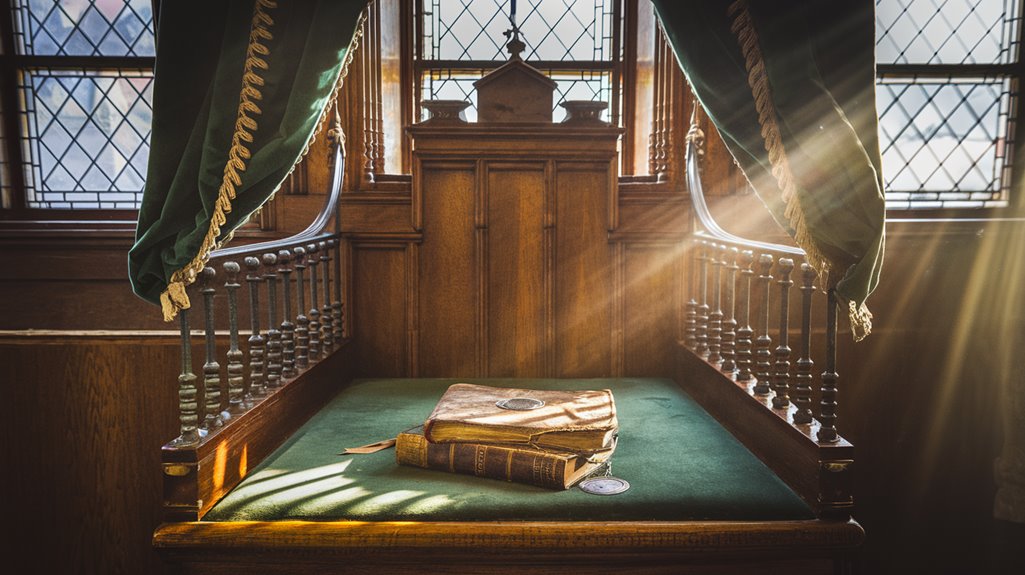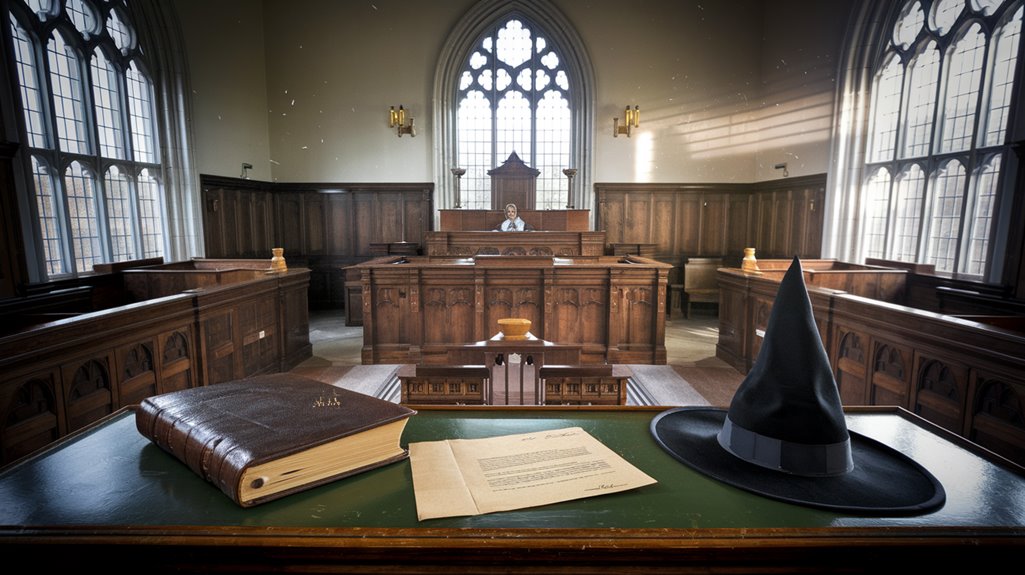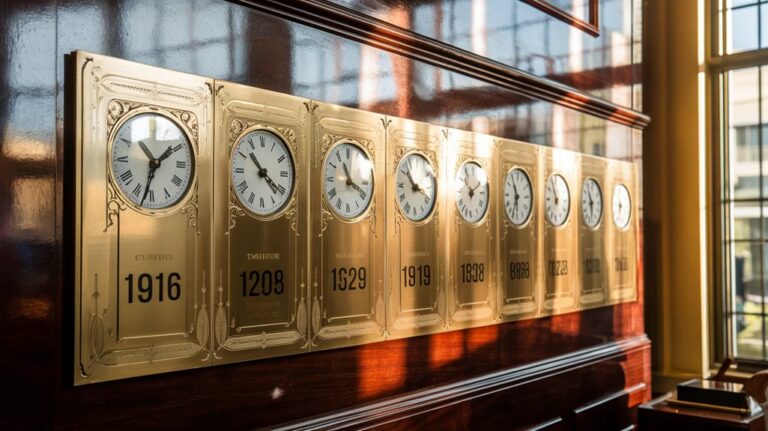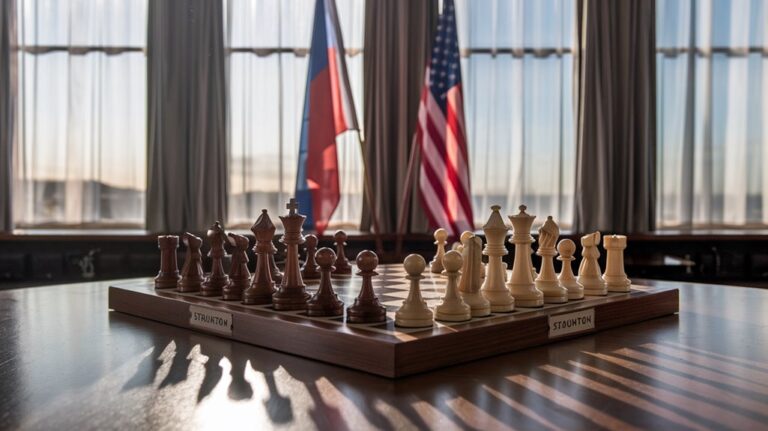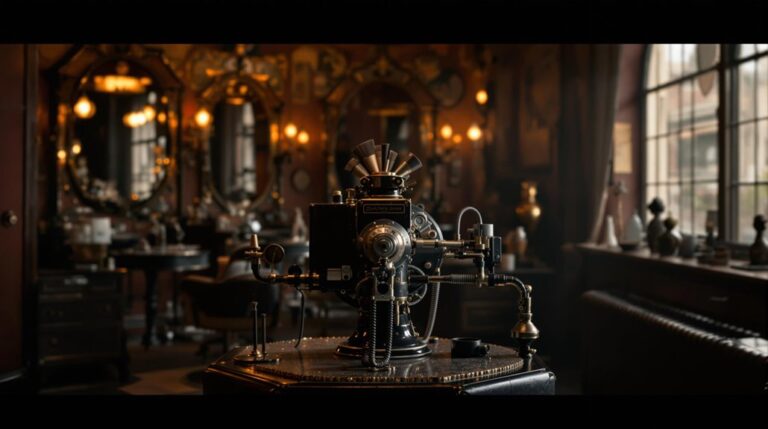Accused of Witchcraft: Britain’s Last Witch Trial Shock
You might think witch trials ended with Salem, but Britain's last witch hunt occurred surprisingly recently – in 1944. When medium Helen Duncan faced prosecution under a dusty 200-year-old law, she sparked a legal drama that caught Winston Churchill's attention. What began as accusations of fraudulent séances transformed into a nationwide spectacle, revealing how wartime paranoia and ancient superstitions collided in the modern era. The shocking details of this case still raise questions about justice and belief today.
The Mysterious Case of Helen Duncan
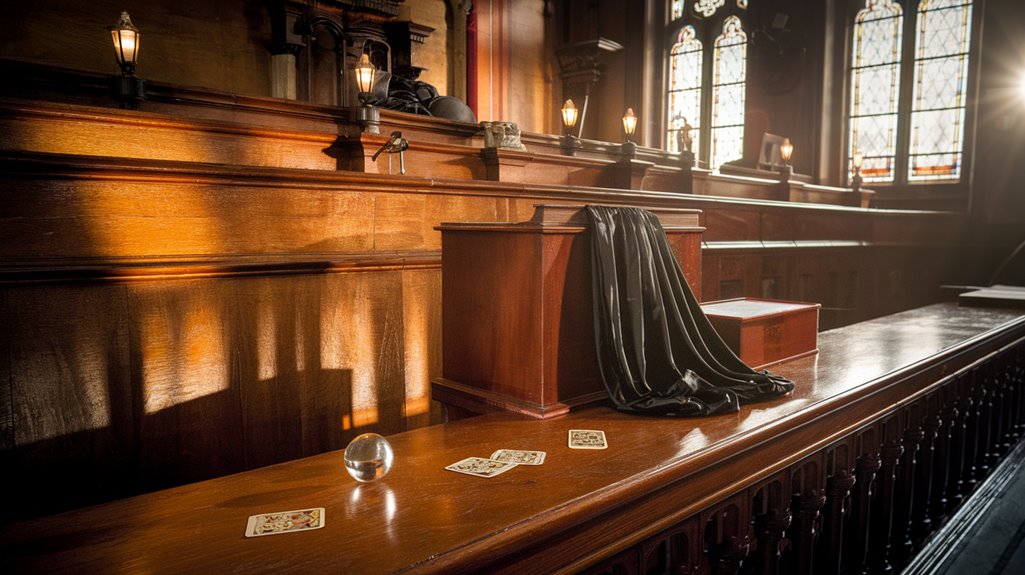
Helen Duncan, born in 1897 to a cabinet-maker in Callander, transformed from a clairvoyant into a controversial figure through her mediumship techniques. She claimed to channel spirits by producing ectoplasm from her mouth during séances, but her methods quickly drew suspicion.
The truth behind Duncan's performances unraveled in 1928 when photographer Harvey Metcalfe's flash photos exposed her ectoplasm fraud.
The London Spiritualist Alliance's investigation revealed she used common materials like cheesecloth and paper to create fake manifestations. Analysis of her ectoplasm samples showed they contained egg white and chemicals.
Further evidence mounted when her former maid confessed to assisting with the tricks, and researcher Harry Price documented her deceptions with photographs. An undercover policewoman proved her fraudulent activities when she grabbed a spirit, revealing it to be white underwear.
Despite being repeatedly exposed, Duncan continued her séances until her arrest in 1944 under the Witchcraft Act.
From Séance to Courtroom Drama
Duncan's exposure as a fraudulent medium took an unexpected turn in 1944 when a police raid disrupted her séance in Portsmouth. The case echoed centuries of extreme judicial measures used against suspected witches.
Prime Minister Winston Churchill questioned the necessity of using archaic laws against her. As she performed her séance rituals near the Royal Navy's Home Fleet base, officers attempted to grab the mysterious ectoplasm flowing from her mouth. Their courtroom strategies later focused on protecting military secrets, particularly after she'd revealed the sinking of HMS Barham before its official announcement.
- The trial at London's Old Bailey lasted seven days
- Prosecutors used the dusty Witchcraft Act of 1735
- Duncan received a nine-month sentence in Holloway Prison
- She was denied the right to appeal to the House of Lords
- Her case sparked public debate about outdated laws
You'll find it fascinating that this trial led to the repeal of the Witchcraft Act in 1951, marking a significant shift in British legal history.
Winston Churchill's Unexpected Intervention
While the trial of Britain's last witch unfolded at the Old Bailey, Prime Minister Winston Churchill expressed private disdain for what he called "tomfoolery" in the courts.
You'd find Churchill's motives were clear: he couldn't fathom why prosecutors were using a 200-year-old Witchcraft Act during wartime, wasting valuable resources and court time.
Churchill took action by sending a memo to Home Secretary Herbert Morrison, questioning both the trial's costs and the use of outdated legislation.
The case centered on Helen Duncan's seances, which had gained immense popularity among families seeking contact with their deceased loved ones.
During her seances, Duncan would produce spirit materializations from ectoplasm with the help of her spirit guides.
His intervention had far-reaching legal implications, as it sparked a movement to modernize Britain's judicial system.
You can trace the eventual repeal of the Witchcraft Act in 1951 and its replacement with the Fraudulent Mediums Act directly to Churchill's stance against this controversial case.
Legacy of Britain's Final Witch Hunt
Churchill's intervention marked the beginning of a broader cultural shift in Britain's relationship with witchcraft accusations. The witchcraft legacy of Britain's final witch hunt transformed how you'd view supernatural claims in modern society, as cultural rationality began to replace superstition in legal proceedings. The development of rational thought was evident in how English courts maintained a 22% execution rate, far lower than continental Europe's rates. The Judge Sir Powell demonstrated this new rationality by openly mocking supernatural evidence during Jane Wenham's trial in 1712.
- You'll notice how the 1736 Witchcraft Act redefined magical claims as fraud rather than supernatural crimes.
- You can trace the shift from execution to prosecution for fraudulent behavior.
- You'll see how enlightenment thinking influenced the decline of witch trials.
- You'll find that Britain moved from supernatural fear to legal skepticism.
- You can observe how this cultural change spread throughout the British Isles, though Scotland maintained stricter views.
This transformation established a foundation for modern legal approaches to supernatural claims, emphasizing evidence and reason over superstition and fear.
World War II and the Hunt for Mediums
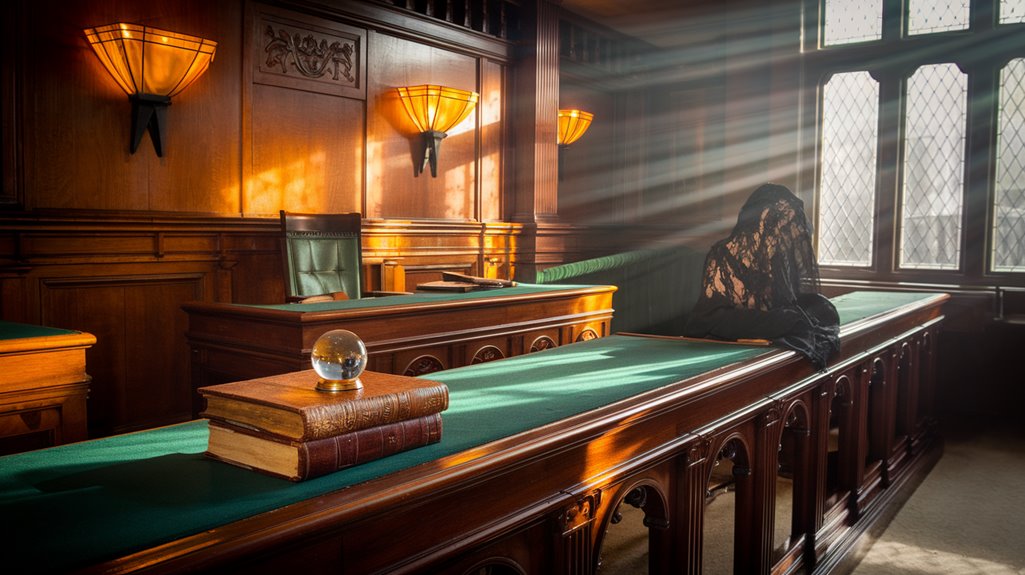
During World War II, Britain's concern with national security took an unusual turn as military officials began hunting mediums who might inadvertently leak classified information.
You might be surprised to learn that mediums during WWII became targets of government surveillance, with Helen Duncan's case standing out as particularly notable.
When Duncan revealed the sinking of HMS Barham before its official announcement, wartime paranoia reached new heights. The British War Office feared these spiritualists could compromise D-Day invasion plans and other military secrets. Her self-proclaimed psychic abilities drew intense scrutiny from naval intelligence officers.
The government's response was to dust off the antiquated Witchcraft Act of 1735, using it to prosecute Duncan.
Even Winston Churchill criticized this approach as "obsolete tomfoolery," but the fear of security breaches prevailed.
Duncan's nine-month imprisonment marked a peculiar intersection of spiritualism and national security concerns.

